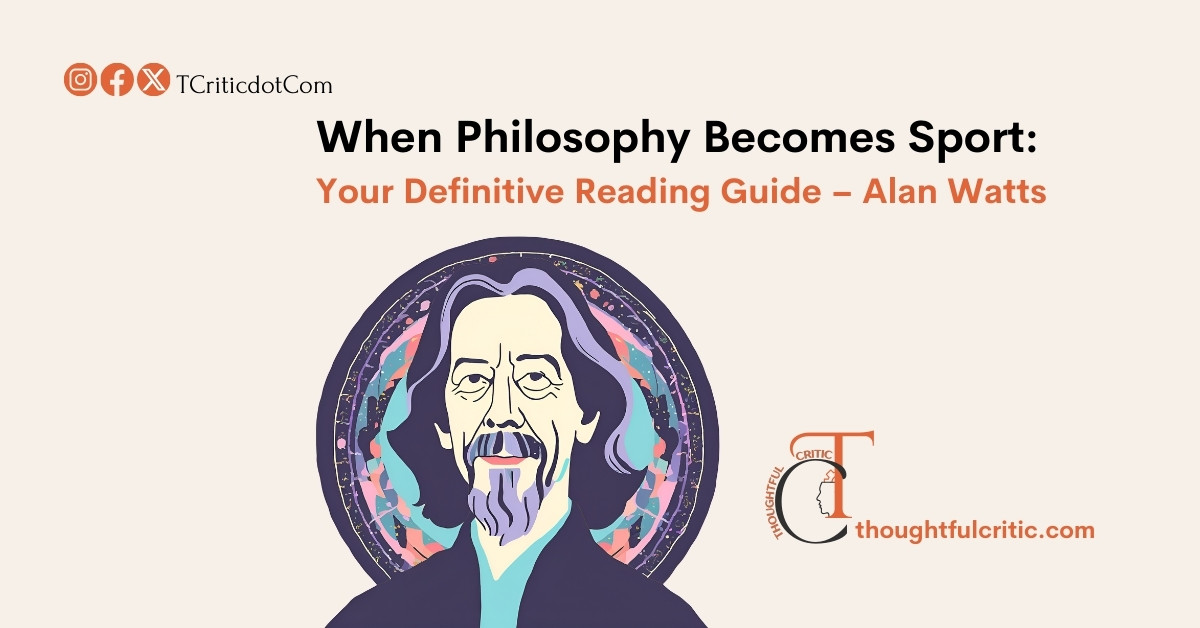I’ll never forget the first time I heard Alan Watts’ voice—that rich, British-accented baritone dancing playfully through some profound philosophical revelation as if he were letting you in on the universe’s best-kept secret. It was one of those old lecture recordings, probably from the 1960s, where he compared life to music: “You don’t sing a song to get to the end,” he chuckled, “just as you don’t dance to reach a particular spot on the floor.” In that moment, something clicked. Here was a thinker who didn’t just explain Eastern philosophy but embodied its spirit—who made the wisdom of Zen masters and Taoist sages feel as natural as breathing.
Alan Watts (1915–1973) wasn’t your typical philosopher. He called himself a “spiritual entertainer,” and that’s exactly how he operated—part sage, part showman, wholly unique. Born in England but making his mark in America, Watts became the bridge between worlds: translating the ineffable truths of Zen Buddhism, the fluid wisdom of Taoism, and the cosmic play of Hinduism into language that resonated with restless Western minds. His refusal to treat enlightenment as some solemn, distant ideal made him different from the academics parsing texts in ivory towers. For Watts, awakening was happening right now—in the way sunlight filters through leaves, in the rhythm of your breath, even in the absurdity of modern life.
I’ve always been struck by how Watts could take concepts that should feel alien, like the Buddhist notion of “no-self” or the Taoist principle of wu-wei (effortless action), making them understandable and downright obvious. His genius lay in his delivery: that twinkle of mischief in his voice when he pointed out how we’re all “pretending to be separate egos,” his delight in comparing the universe to a “cosmic game of hide-and-seek.” He wrote books, yes, but his live recordings genuinely captured his magic—the laughter, the pregnant pauses, the sense that he wasn’t lecturing but conspiring with you to unravel life’s grand joke.
It’s no wonder the counterculture of the 1950s and ’60s adored him. Here was a man in a suit and tie (often with a martini in hand) who could out-hip the hippies, who spoke of meditation and mindfulness years before they became buzzwords. But what’s remarkable is how his voice still feels startlingly fresh today. In our age of burnout and digital overload, Watts’ reminder that “the meaning of life is just to be alive” lands with new urgency. He wasn’t selling some rigid dogma or self-improvement regimen—he was inviting us to wake up to the sheer wonder of existence itself.
That’s the Watts effect: he doesn’t just change how you think; he changes how you experience. After listening to him, you might find yourself staring at a tree with newfound reverence, or catching yourself in the act of worrying and suddenly laughing at the absurdity. It’s philosophy as liberation—not from life, but into it. And that’s why, decades after his death, people still discover his work with the same electric sense of recognition I felt that first time. As Watts himself might say: the message isn’t complicated. We’re already home. We’ve just forgotten how to dance.
Alan Watts’ Writing Style: The Playful Philosophy
The first time I cracked open The Wisdom of Insecurity, I expected another dense philosophical tome, but what I got instead felt like sharing whiskey with a mischievous Oxford don who’d studied under Zen masters. Within pages, Watts had me chuckling at the absurdity of human anxiety—comparing our pursuit of security to “a man trying to bite his teeth”—while simultaneously unraveling my deepest existential knots. That was Watts’ magic: he didn’t just write about enlightenment; he smuggled it into your mind wrapped in wordplay and wonder.
Watts’ prose dances where other philosophers march. Where academic texts build walls of footnotes, he built bridges from koans to cocktail parties. His secret? Theatrical clarity. He’d take something as elusive as the Buddhist concept of maya (illusion) and recast it as a cosmic game: “The universe is essentially a playful existence,” he wrote in The Book, “and that means you’re it—only you’re pretending not to be.” Notice how he swaps Sanskrit terminology for language that sparkles with recognition. Suddenly, the nature of reality feels less like a metaphysics exam and more like a child realising they’ve been chasing their own shadow.
His toolkit was uniquely potent:
- Metaphors that stick like burrs – Consciousness becomes a whirlpool in the ocean of existence; the ego is a clenched fist that must relax to receive reality.
- Anecdotes that disarm – Recounting a drunk man searching for lost keys under a streetlamp (“It’s lighter here!”), he exposes humanity’s misplaced search for meaning.
- Humor as a Trojan horse – “If you say ‘I woke up one day and realised I was God,’ you’ll get locked up. But if you say ‘God woke up one day and realised he was you,’ they might give you a professorship at Harvard.”
Critics (usually those who’ve never made a classroom laugh) accuse Watts of dilution—that his jazz-like improvisations on Zen and Taoism sacrificed depth for delight. There’s some truth here: he’d rather have you taste satori through a story about forgetting your wallet than map the Five Ranks of Dongshan. But this misses his radical intent. Like a Taoist cook who knows broth can’t be boiled by force, Watts understood that the hardest truths must slip in sideways. His “oversimplifications” were often deliberate traps—luring Western minds raised on Cartesian logic into realising mid-chuckle, that they’d just apprehended non-duality.
I’ve seen this alchemy work firsthand. A friend who’d bounced off The Tibetan Book of the Dead devoured The Way of Zen because Watts framed meditation as “listening to the sound of rain without calling it rain.” Another, skeptical of spirituality, found herself disarmed by his comparison of the universe to an optical illusion: “You think you’re a lonely cloud, when really you’re the whole sky pretending.” That’s Watts’ legacy—not systematic theology, but sudden perceptions shifts disguised as dinner-party banter.
Does this approach risk flattening traditions? Perhaps. But as Watts might retort: “The menu is not the meal.” By sanding off the esoteric edges of Eastern thought, he allowed millions to taste what scholars often only describe. His writing doesn’t just explain awakening—it performs it, sentence by sly sentence. And that’s why, decades later, his pages still vibrate with the energy of a man leaning across the table, eyes twinkling, whispering: “But what if none of this is serious?”
The Essential Alan Watts: A Critical Reading List
1. The Way of Zen (1957)
Why It’s Essential: Watts’ most scholarly yet accessible work, The Way of Zen, traces Zen Buddhism’s historical roots in China and Japan while unpacking its core principles—non-duality, satori (awakening), and the art of “unlearning.” Unlike many Western interpreters, Watts doesn’t reduce Zen to mere self-help; he captures its paradoxical nature, where seeking enlightenment is the obstacle.
Best For: Readers who want a structured introduction to Zen without academic dryness.
2. The Wisdom of Insecurity (1951)
Why It’s Essential: Here, Watts tackles the Western obsession with control and certainty, arguing that true peace comes from embracing life’s impermanence. Drawing on Taoism and Buddhism, he critiques the futile chase for security and proposes a radical alternative: living fully in the present.
Best For: Those struggling with anxiety, overthinking, or the modern cult of productivity.
3. The Book: On the Taboo Against Knowing Who You Are (1966)
Why It’s Essential: Watts’s most provocative work, The Book, challenges the Western notion of the isolated “ego,” proposing instead that we are all expressions of a unified cosmic consciousness. It’s a mind-bending yet playful take on identity, blending Vedanta, Zen, and modern psychology.
Best For: Readers ready to question deep-seated assumptions about the self.
4. Become What You Are (1955/1995)
Why It’s Essential: A collection of short essays and lectures, this book distills Watts’ key ideas—non-striving, the illusion of separation, and the art of effortless living. Its brevity makes it ideal for dipping in and out of his philosophy.
Best For: Those who prefer bite-sized wisdom over dense philosophical tracts.
5. Out of Your Mind: Tricksters, Interdependence, and the Cosmic Game (Posthumous, 2017)
Why It’s Essential: Compiled from his legendary lectures, this book captures Watts’ electrifying spoken-word style. Themes include the playful nature of existence, the myth of the separate self, and why life is best approached as music rather than a problem to be solved.
Best For: Fans of his audio talks who want his most dynamic, unscripted insights in print.
How to Begin Reading Alan Watts: A Guided Journey
Watts’ books vary in depth and style, so here’s the optimal path for newcomers:
- Start with The Wisdom of Insecurity, a gentle yet profound entry point that addresses universal human anxieties in Watts’ signature engaging style.
- Move to The Way of Zen – Deepen your understanding of his core philosophical influences with this foundational text.
- Next, The Book—Once you are comfortable with his ideas, let this radical take on identity expand your perspective.
- Then, Become What You Are – Short essays reinforce key concepts without overwhelming the reader.
- Finally, Out of Your Mind—End with his most exhilarating lecture-style work to fully experience his oratory brilliance.
Beyond Watts: 5 Philosophers Who Interpret the East for the West
If Watts sparks your curiosity, explore these thinkers who bridge Eastern and Western thought:
- D.T. Suzuki – The scholar who introduced Zen to the West; more academic than Watts but equally transformative (Zen and Japanese Culture).
- Lao Tzu (via Stephen Mitchell’s translation) – The Tao Te Ching is the poetic root of Watts’ Taoist influences.
- Jiddu Krishnamurti – A mystic who, like Watts, rejected dogma but eemphasiseddirect perception (Freedom from the Known).
- Thich Nhat Hanh – A Zen master whose mindfulness teachings offer practical serenity (The Miracle of Mindfulness).
- Joseph Campbell – Though focused on mythology, his The Hero with a Thousand Faces complements Watts’ ideas on universal consciousness.
Why Alan Watts Still Feels Like a Cosmic Whisper in Our Digital Storm
I was doom-scrolling through Twitter-turned-X by Musk last night—that modern sacrament of anxiety—when a Watts quote floated across my feed: “We are living in a culture entirely hhypnotisedby the illusion of time.” Suddenly, my thumb froze mid-swipe. The screen’s glow felt absurd. Outside my window, a real moon hung over real trees, and I remembered I had a body for the first time in hours. That’s the enduring witchcraft of Watts: his words don’t just inform; they defibrillate.
In our pixelated age of productivity cults and algorithmic angst, Watts matters more urgently than ever precisely because he refused to take the modern game seriously. Where others sell mindfulness as a tool for better focus (read: better capitalism), Watts laughed at the whole enterprise: “The meaning of life is just to be alive. It is so plain and so obvious and so simple. And yet, everybody rushes around in a great panic as if it were necessary to achieve something beyond themselves.” That sentence alone, written decades before the invention of smartphones, diagnoses our collective burnout with the precision of a Zen archer.
What makes Watts perpetually contemporary isn’t just his ideas—it’s his delivery. He sidesteps the solemnity trap that plagues both gurus and academics. Read his description of the universe as “a musical thing where the essence is the dance” while stuck in traffic, and suddenly your honking commute becomes a symphony of honking. His genius was recognising that profound truths must be smuggled past our mental gatekeepers—wrapped in humor, slipped in with a martini joke, or hidden inside an analogy about waves, realising they’re the ocean.
For the skeptics (I was one), Watts disarms with logic-turned-kaleidoscope: “Trying to define yourself is like trying to bite your teeth.” For the seekers (I became one), he offers no answers but experiential shortcuts—like his legendary meditation advice: “Listen to the world as you listen to music.” Even the casually curious find themselves disoriented in the best way, as when he compares enlightenment to “a snowball fighting to resist melting—not realising it’s already water.”
Start with The Wisdom of Insecurity, not because it’s his most straightforward work, but because it’s his most subversive antidote to 21st-century neuroses. Let him dismantle your addiction to “someday” thinking. Laugh when he compares human civilisation to “an army marching resolutely toward a cliff—but in step!” Then notice, hours later, how your shoulders drop when you catch yourself not reaching for your phone during a sunset. That’s the Watts effect: his philosophy doesn’t live in books, but in the spontaneous moments when you remember—with a jolt—that you’re not a separate ego staring at screens, but the universe “playing hide-and-seek with itself.”
So here’s my confession: I no longer “study” Watts. I keep him around like a friend who knows exactly when to whisper “But what if none of this is important?” right before I spiral into existential panic. That’s why his voice keeps surfacing in memes, podcasts, and late-night dorm room debates—not as dusty wisdom, but as a live wire jolting us awake to the radical truth hiding in plain sight: You are already home. The dance is already happening. And you only need to “achieve” the courage to join it.
Interested in reading Watts? Who won’t be? Get his books from Amazon – click here.
by Vyom for Thoughtful Critic





Thank you for this. So helpful – and beautifully written.